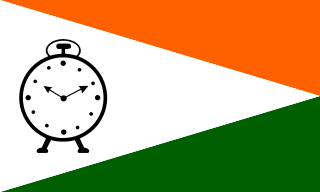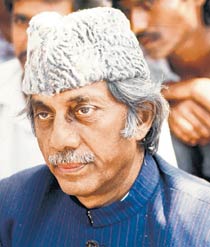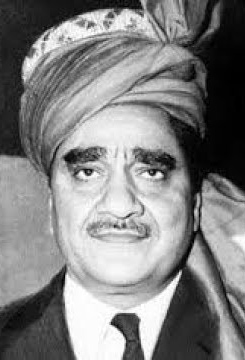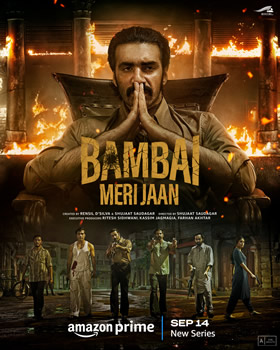Related Research Articles

The Nationalist Congress Party is one of the state parties in India. It refers to the Ajit Pawar faction after the 2023 split in the party when the Supreme Court of India granted the original party name and symbol to the Nationalist Congress Party. It was one of the major political parties in Maharashtra and was a recognised state party in Nagaland and Kerala. In July 2023, majority of the elected MLAs and MLCs of the party led by Ajit Pawar joined the National Democratic Alliance government, however, all MPs except two remained loyal to Sharad Pawar. This caused a direct split between the Ajit Pawar-led faction and the founder and president Sharad Pawar who formed the Nationalist Congress Party after EC recognised the Ajit Pawar faction as the original party.
Abu Salem, also known as Aqil Ahmed Azmi and Abu Samaan, is an Indian criminal gangster and terrorist from Azamgarh district in Uttar Pradesh, Central India. Abu Salem worked in the D-Company as a driver transporting artillery and contraband. Later he rose among the ranks after he introduced a new strategy of hiring unemployed youths from his hometown Azamgarh to come to Mumbai, execute shoot-outs and return the next day remaining untraced by the Mumbai police. He is currently serving a life sentence in India.
Arun Gulab Gawli also known as Arun Gulab Ahir, is an Indian politician, underworld don and retired gangster. Gawli and his brother Kishor (Pappa) entered the Mumbai underworld in the 1970s, when they joined the "Byculla Company", a criminal gang led by Rama Naik and Babu Reshim, operating in the central Mumbai areas of Byculla, Parel and Saat Rasta. In 1988, after Rama Naik was killed in a police encounter, Gawli took over the gang and began operating it from his residence, Dagdi Chawl. Under his control, the gang controlled most criminal activities in the central Mumbai areas. Throughout the late eighties and nineties, Gawli's gang was involved in a power struggle with Dawood Ibrahim's D-Company gang. Gawli is also the founder of the Akhil Bharatiya Sena political party based in Maharashtra.
Organised crime in India refers to organised crime elements originating in India and active in many parts of the world. The purpose of organised crime in India, as elsewhere in the world, is monetary gain. Its virulent form in modern times is due to several socio-economic and political factors and advances in science and technology. There is no firm data to indicate the number of organised criminal gangs operating in the country, their membership, their modus operandi, and the areas of their operations. Their structure and leadership patterns may not strictly fall in line with the classical Italian mafia.

Rajendra Sadashiv Nikalje, popularly known by his moniker Chhota Rajan, is an Indian gangster and convicted criminal who served as the crime lord of a major crime syndicate based in Mumbai.

Shootout at Lokhandwala is a 2007 Indian Hindi-language action thriller film directed and co-written by Apoorva Lakhia and co-written and co-produced by Sanjay Gupta, with Ekta Kapoor serving as producer and Suresh Nair serving as writer. Based on the 1991 Lokhandwala Complex shootout, a real-life gun battle between gangsters and the Mumbai Police, it stars Amitabh Bachchan, Sanjay Dutt, Suniel Shetty, Vivek Oberoi, Arbaaz Khan, Tusshar Kapoor, Rohit Roy, Aditya Lakhia, and Shabbir Ahluwalia in pivotal roles.

HajiMastan Popularly known as Sultan Mirza, was an organised crime gang leader, originally from Tamil Nadu and based in Bombay. He was one of an infamous trio of mafia gang leaders in Bombay for over two decades from the 1960s to the early 1980s, along with Karim Lala leader of the Pathan gang, and Varadarajan Mudaliar, another famous gang leader from Tamil Nadu in South India.
Suresh Budharmal Kalani, known popularly as Pappu Kalani is an Indian criminal-politician from Ulhasnagar, Maharashtra.
Maya Dolas was an Indian gangster who used to work for the D-Company don, Dawood Ibrahim. He was killed in an encounter at the 1991 Lokhandwala Complex shootout by the then Additional Police Commissioner of Mumbai, Aftab Ahmed Khan, at the age of 25.

Karim Lala, born as Abdul Karim Sher Khan in the Samalam Village of the Shegal District of the Kunar province of Afghanistan. The other two being Mastan Mirza aka Haji Mastan and Varadarajan Mudaliar.
Ali Baba Budesh was a notorious Indian extortionist and underworld mobster, based in Bahrain. He was mostly active in 1990s. Fearing backlash from the Mumbai police, Budesh fled to Bahrain in the late eighties, where he opened up his new base of operations in the capital city of Manama. He died in coma as he was suffering from sugar related illness.
Sachin Hindurao Vaze is a former Indian police officer who served as an Assistant Police Inspector in Mumbai Police. He was dismissed from service by Mumbai Police Commissioner under Article 311 (2) (b) without a departmental enquiry. He is currently in the custody of the National Investigation Agency for his alleged involvement in the Antilia bomb scare and the murder of Mansukh Hiren. He was a member of Shiv Sena.
The 1991 Lokhandwala Complex shootout was a gunbattle that occurred on 16 November 1991 at the Lokhandwala Complex, Mumbai, between seven gangsters led by Maya Dolas and members of the Bombay Police and the Anti-Terrorism Squad (ATS) led by the then Additional Commissioner of Police, A. A. Khan. The four-hour-long shootout was termed as India's "first daylight encounter" and was videographed and conducted in full view of the public. It ended in the deaths of all seven gangsters, including Maya Dolas and Dilip Buwa.
Dawood Ibrahim is an Indian mob boss, drug lord, and terrorist. He reportedly heads the Indian organised crime syndicate D-Company, which he founded in Mumbai in the 1970s. Ibrahim is wanted on charges including murder, extortion, targeted killing, drug trafficking, and terrorism.

Shootout at Wadala is a 2013 Indian action-crime film written and directed by Sanjay Gupta. The film stars Anil Kapoor, John Abraham, Manoj Bajpayee, Tusshar Kapoor, Kangana Ranaut and Sonu Sood. It is a prequel to the 2007 film Shootout at Lokhandwala. In the film, Manya, a diligent student, lands in prison for killing a gangster who attacked his brother, Bhargav, who eventually dies. Soon, Manya escapes jail and forms his own gang to seek revenge.
Shabir Ibrahim Kaskar was a notorious Indian criminal based in Mumbai. He was the elder brother of Dawood Ibrahim, the current gang leader of the D-Company. The rise of Shabir and Dawood in Mumbai's underworld and the sympathetic attitude of the Mumbai police department toward them evoked the jealousy and resentment of other established gang members from the Pathan gang that dominated the South Mumbai area. The inter-gang rivalry grew to such an extent that Manya Surve, his gang, along with Amirzada and Alamzeb plotted to kill Shabir and Dawood. On 12 February 1981, they shot Shabir at a petrol pump in Prabhadevi.

Nawab Malik is an Indian politician who served as the Minority Development, Skill Development and Entrepreneurship Minister of Maharashtra and also the guardian minister of Gondia & Parbhani. He is the National Spokesperson and Mumbai President of the Nationalist Congress Party.
Uzair Jan Baloch is a Pakistani gangster, former crime lord and head of the outlawed Peoples' Aman Committee.

Pradip Sawant is an Indian Police Officer, currently serving as the DCP Security Branch in Mumbai Police. He is a recipient of the President's Police Medal for Meritorious Service in 2002. He was behind more than 300 encounters in Mumbai during his stint as DCP between the years 2000 and 2003.

Bambai Meri Jaan is an Indian Hindi-language period crime thriller television series produced under the banner of Excel Entertainment. The series stars Kay Kay Menon, Avinash Tiwary, Kritika Kamra, Nivedita Bhattacharya, and Amyra Dastur. It premiered on Amazon Prime Video.
References
- 1 2 3 4 5 6 7 Jake Khan, Ulhasnagar (25 January 2000). "Sena leader Gopal Rajwani shot dead". Ulhasnagar: India Abroad. Archived from the original on 9 September 2012. Retrieved 27 May 2007.
- 1 2 3 Yogesh Pawar (3 March 1999). "Three Ps rule Ulhas: Pelf, Politicians & Pappu". Indian Express . Retrieved 24 May 2007.
- 1 2 Girish Kuber (9 January 2007). "Pappu's Ulhasnagar gambit may backfire". The Economic Times . Retrieved 24 May 2007.
- ↑ S Hussain Zaidi (5 February 1998). ""Mr Controversy" seeks a clean ticket". Indian Express . Archived from the original on 4 June 2007. Retrieved 23 May 2007.
- ↑ Justices K.T. Thomas & D.P. Mohapatra (2 March 2001). "Suresh alias Pappu Bhudharmal Kalani v. State of Maharashtra". Supreme Court of India . Retrieved 30 May 2007.[ permanent dead link ]
- ↑ Tanushree Chakraborty (6 September 2001). "Pappu Kalani is free: bluster intact, not his base". Indian Express. Archived from the original on 29 September 2007. Retrieved 24 May 2007.
